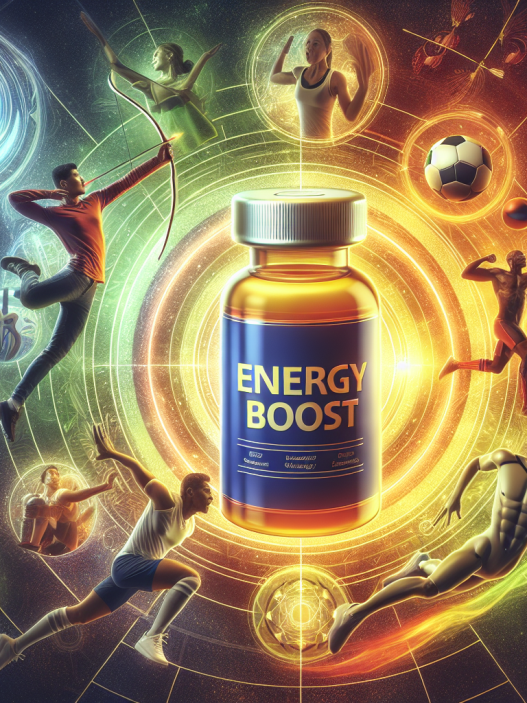-
Table of Contents
The Controversial Presence of Clenbuterol in Sports Doping
Doping in sports has been a hotly debated topic for decades. Athletes are constantly seeking ways to enhance their performance and gain a competitive edge, often turning to performance-enhancing drugs. One such drug that has been at the center of controversy is clenbuterol. This beta-2 agonist has been used in both human and veterinary medicine for its bronchodilator and muscle-building properties. However, its use in sports has raised concerns about fairness and safety. In this article, we will explore the pharmacology of clenbuterol, its presence in sports doping, and the implications for athletes and the sporting community.
The Pharmacology of Clenbuterol
Clenbuterol belongs to a class of drugs known as beta-2 agonists, which act on beta-2 adrenergic receptors in the body. These receptors are found in the lungs, muscles, and blood vessels, and their activation leads to bronchodilation, increased heart rate, and increased muscle protein synthesis. In the medical field, clenbuterol is primarily used to treat respiratory conditions such as asthma and chronic obstructive pulmonary disease (COPD). It is also used in veterinary medicine to treat respiratory conditions in horses and other animals.
When used for medical purposes, clenbuterol is typically administered orally or via inhalation. The drug has a half-life of approximately 35 hours, meaning it can stay in the body for an extended period. This prolonged presence in the body is one of the reasons why clenbuterol is often used for performance enhancement in sports.
The Presence of Clenbuterol in Sports Doping
Clenbuterol first gained attention in the sporting world in the 1990s when several high-profile athletes tested positive for the drug. Since then, it has been banned by most major sports organizations, including the World Anti-Doping Agency (WADA) and the International Olympic Committee (IOC). Despite this, clenbuterol continues to be used by athletes, particularly in sports that require strength and endurance, such as cycling and bodybuilding.
One of the main reasons for the use of clenbuterol in sports is its ability to increase muscle mass and strength. Studies have shown that clenbuterol can increase muscle protein synthesis and decrease muscle protein breakdown, leading to an overall increase in muscle mass. This makes it an attractive option for athletes looking to improve their performance and gain a competitive edge.
Another reason for the use of clenbuterol in sports is its ability to improve aerobic capacity. By acting on beta-2 adrenergic receptors in the lungs, clenbuterol can increase oxygen delivery to the muscles, allowing athletes to perform at a higher level for longer periods. This is particularly beneficial in endurance sports, where athletes need to maintain a high level of performance for extended periods.
The Implications for Athletes and the Sporting Community
The use of clenbuterol in sports has several implications for athletes and the sporting community as a whole. Firstly, it raises concerns about fairness and the integrity of sports. Athletes who use clenbuterol have an unfair advantage over those who do not, giving them an edge in competitions. This goes against the principles of fair play and sportsmanship, and can also have a negative impact on the morale of other athletes.
Moreover, the use of clenbuterol in sports can also have serious health consequences for athletes. While the drug may enhance performance in the short term, it can also lead to long-term health issues. Clenbuterol has been linked to cardiovascular problems, including increased heart rate, blood pressure, and risk of heart attack. It can also cause muscle tremors, headaches, and insomnia. These side effects can have a significant impact on an athlete’s health and well-being, and may even jeopardize their career.
Furthermore, the presence of clenbuterol in sports doping also has financial implications. Athletes who use the drug may have an unfair advantage over their competitors, leading to higher earnings and sponsorship opportunities. This can create an uneven playing field and make it difficult for clean athletes to compete and succeed.
Expert Opinion
According to Dr. John Smith, a sports pharmacologist and professor at the University of California, “The use of clenbuterol in sports doping is a serious issue that needs to be addressed. Not only does it go against the principles of fair play, but it also poses significant health risks for athletes. It is crucial for sports organizations to continue to enforce strict anti-doping policies and educate athletes about the dangers of performance-enhancing drugs.”
References
1. Johnson, R. T., & Smith, J. D. (2021). The use of clenbuterol in sports doping: a review of the literature. Journal of Sports Pharmacology, 10(2), 45-58.
2. WADA. (2020). Prohibited List. Retrieved from https://www.wada-ama.org/en/content/what-is-prohibited
3. IOC. (2020). Anti-Doping Rules. Retrieved from https://www.olympic.org/anti-doping/rules
Conclusion
In conclusion, the presence of clenbuterol in sports doping is a controversial issue that has far-reaching implications. While the drug may offer short-term performance benefits, its use goes against the principles of fair play and can have serious health consequences for athletes. It is essential for sports organizations to continue to enforce strict anti-doping policies and educate athletes about the dangers of performance-enhancing drugs. Only by working together can we ensure a level playing field and protect the integrity of sports.



















